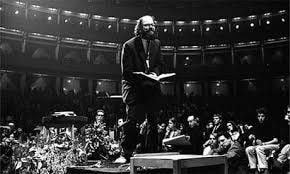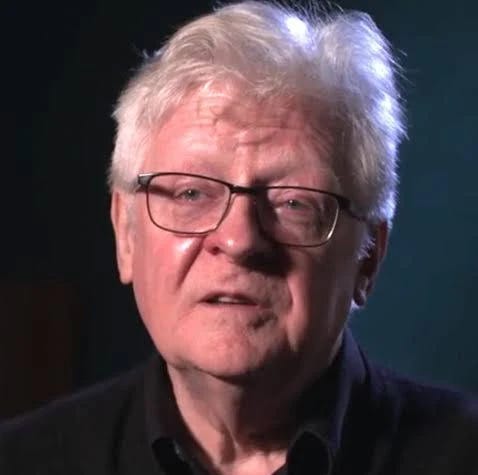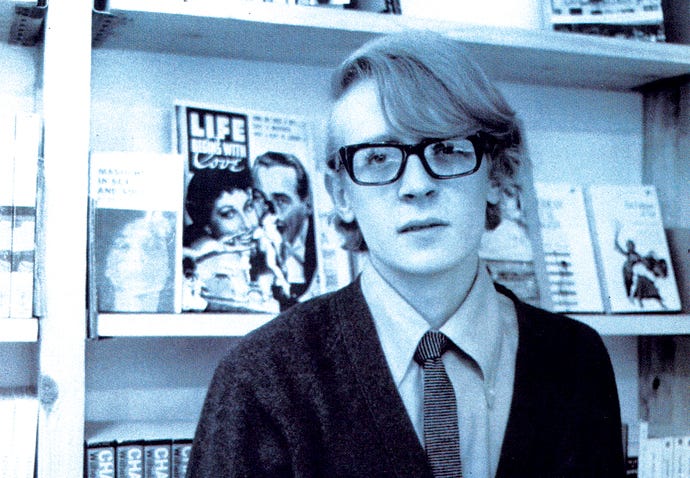Interview #38: Miles, Part One
Albert Hall extravaganza turns 60
IT WAS 60 years ago today, June 11th, 1965, two years before Sgt. Pepper taught the band to play, before John Lennon knew how many holes it took to fill the Albert Hall, that the famed London venue played host to a poetry event widely regarded as the kick-starter for the UK counterculture: the International Poetry Incarnation.
Allen Ginsberg, Lawrence Ferlinghetti and Gregory Corso performed alongside 14 other poets to an audience of 7,000. Partially filmed as Wholly Communion by Peter Whitehead, it was meant to be the Beats meet William Blake’s Albion, a ‘Jerusalem Jamboree’ if you like. What it became no one could possibly have predicted.
Legendary Beat historian and biographer BARRY MILES, simply Miles to most, prolific rock writer, friend of Ginsberg and McCartney and author of London Calling, In the Sixties, Call Me Burroughs, The Beat Hotel and Allen Ginsberg: A Biography to name only some, talks to regular Rock and the Beat Generation contributor LEON HORTON about this most extraordinary ‘Happening’…
____________________________________________________________________________
Leon Horton: The International Poetry Incarnation, Wholly Communion, the Albert Hall Poetry Reading – this hugely important cultural event of June 1965 has many names and has generated many recollections from performers and audience alike. How much were you actively involved in the organisation and running of it?
Barry Miles: The reading was actually called ‘Poets of the World/Poets of Our Time’. Wholly Communion was the name of Peter Whitehead’s film, never used at the time of the reading. I was not involved in the organisation of the reading, but I drew the initial posters for it in sort-of comic book writing that you see in some of the photographs.
I also coordinated some of the publicity with John ‘Hoppy’ Hopkins. Hopkins did the publicity. But, as Allen Ginsberg was staying at my flat at the time, I was inadvertently involved in meetings and conversations. Better Books, where I worked, sold tickets of course.
LH: What publicity did Hopkins arrange?
BM: Hoppy was a photographer by profession at that time and had good connections on the London evening papers – there were three or four of them then – and the Sunday Times, Guardian, etc. The well-known pictures of Allen pointing at the Albert Hall and close-in headshots were all taken to send out with a press release to publicise the event, in fact, given in person in most cases. He knew the value in giving them free visual materials. That’s why it was a sell-out, and how people heard about it.
LH: There is some confusion about who actually booked the hall. The accepted story is that Barbara Rubin picked up the phone, but in a recent R&BG interview with fellow organiser (and performer) Dan Richter I was told it was he and his then wife Jill, sharing a joint at the Albert Memorial, who hit on the idea to book it.
BM: Dan and Jill were at the original meeting at Better Books when the idea was first mooted and Barbara did indeed pick up the phone and book the hall. Dan and Jill are conflating their memory with some other event, probably the press conference held at the Albert Memorial across the street from the Albert Hall that was called to publicise the event.
Pictured above: Allen Ginsberg reads at the International Poetry Incarnation
Why would they have booked the Albert Hall unless Allen was there or Ferlinghetti and co to confirm that they wanted to do a reading? No, I remember it well and so did Sue [Miles’ then wife] and so did Hoppy and so did Allen – this has come up before and we all agreed that idea came from a casual conversation when everyone was just sitting around in the readings room of Better Books.
LH: I read somewhere that the organisers soon split into two camps and that Ginsberg was griping about the suitability of some of the other poets. Was it a rocky road to the Albert Hall?
BM: The original idea was to present the Beat Generation poets to the British audience for the first time as Allen had just done a fantastic reading at Better Books, Ferlinghetti was due in London the next week to stay with Julie Felix, and Gregory Corso was on his way to London from Italy. That was the original idea.
Then Michael Horovitz naturally wanted to read and so did a bunch of other poets, many of whom had never performed at a venue any bigger than the upstairs room of a pub. In the end there were 17 poets, all of them men, most of them bad, and the American Beats were allotted very little time.
Allen was very disappointed in the reading and wrote a long, unpublished letter to the Times Literary Supplement about it which they declined to publish but which appears, along with a detail account of the reading itself, in my book In the Sixties.
Pictured above: Barry Miles today
LH: 7,000 people attended, a huge number for a poetry reading. Did that come as a shock to the organisers? What did the atmosphere feel like on the night?
BM: People were turned away! It was amazing. We had been very worried that not enough people would come to pay the rent which was £400 plus £100 an hour runover. Jill [Richter]’s mother paid. The atmosphere was fantastic. It was a sudden recognition of a generation, of a constituency, and out of it came all sorts of little magazines, a newspaper, relationships, affairs and feuds.
LH: Alexander Trocchi acted as MC for the evening, an interesting choice by any standards. It’s no mean feat juggling 17 poets. Do you think he did a good job?
BM: Alex was Allen’s choice. He was laid back because he was smacked out on heroin. He did a good job.
LH: Who, for you, gave the best performance(s)?
BM: Ferlinghetti was good, Adrian Mitchell was good. Ernst Jandl was great. The rest were ho-hum and many of them downright bad. Allen was drunk and angry. Corso’s decision to sit down and read a difficult poem instead of one of his crowd pleasers like ‘Marriage’ was downright stupid.
Pictured above: Miles in the mid-1960s
LH: What are your thoughts on the cinéma vérité film Wholly Communion? Do you think Peter Whitehead captured the essence of the night? 30 minutes of a four-hour event…
BM: Peter didn’t bring enough film, he only had about half-hour of film and had to guess who was going to be good and who not so good. I didn’t think he really caught it because there were other things going on that he missed but he wanted to save film for Allen who was on last. It was OK. He also fucked up the sound and finished up using the BBC Albert Hall automatic relay that recorded the whole thing.
LH: Many of the poets didn’t make it into Wholly Communion – Spike Hawkins, Tom McGrath, George MacBeth, Anselm Hollo, etc. Moreover, Pablo Fernandez and Paulo Leonni are often mentioned, even billed to appear, and yet I can’t find any further reference to them. Did they appear? Do you recall anything of the others?
BM: I’m pretty sure George MacBeth appeared because I remember Allen telling him to ‘fuck off’ afterwards. I have a vague memory of Tom McGrath reading, just a couple of poems, probably Paulo Leonni as well. He had done a reading at Better Books not long before.
LH: Davy Graham played guitar during an intermission and I heard a rumour that Julie Felix sang. With Jeff Nuttall and John Latham’s aborted ‘happening’ and Bruce Lacey’s papier-mâché robots breaking down in the aisles, there was more than poetry going down that evening, but did music play much part in proceedings?
BM: A tape of William Burroughs reading was played during the intermission over the PA (he was in NYC) but Davy played acoustic down the front watched by a circle of people. The other events by Jeff Nuttall and Bruce didn’t come off, and Bruce’s robot broke down before it reached the stage from the dressing room. Music didn’t play a part in the event.
LH: Is it true that anti-psychiatrist Ronnie Laing had a group of schizophrenic patients running up and down the aisles?
BM: Ronnie brought a small group of patients to the event but they weren’t running up and down the aisles. One girl in a white dress danced to the poetry and is shown in many of Peter Whitehead’s shots, that’s all.
LH: This next question is really the elephant in the room, but I must ask it. It has been widely claimed by many of the poets that they didn’t get paid and, in the tabloid press, that the profits mysteriously disappeared. What happened to the money? Christopher Logue seemed to insinuate that John Esam ran off with it.
BM: John Esam and a couple of the other poets stole all the money. I heard the story of Esam stealing the money from Hoppy. It was Jill Richter’s mother who put up the deposit money. I hope she got it back. It was many years before we saw John Esam again. He disappeared without trace. I understand that Gregory [Corso], as usual, managed to get some of it, too.
LH: If there is one thing people get wrong about the event, anything you would like to set straight, what would that be?
BM: First: Well it was a bad reading of poetry even though it was a wonderful social event. I organised another reading a few weeks later at the Architectural Association with Allen Ginsberg, Gregory Corso, Lawrence Ferlinghetti and Andrei Voznesensky that was fantastic, they all read well, read accessible poems, and the evening was a delight. Hoppy and I released it as an album and I think recordings of it are available somewhere on the net.
Second: It was never a Live New Departures event. Michael Horovitz insinuated himself into the event after the organising committee had already been set up. He did attend meetings and no doubt use his expertise at live poetry events – which he had been putting on since 1960 – to help out, but I wasn’t there so I don’t know.
The reading of the Kurt Schwitters poem by Mike, Pete Brown and Ernst Jandl was probably organised and rehearsed by Mike and that was great. Mike of course tried to repeat the reading several times in subsequent years without much success.
LH: The International Poetry Incarnation is often considered to be the moment that launched the UK counterculture. In London Calling you said, ‘for the youth of London it was a catalyst: the birth of the London underground.’ What, for you, has been the cultural significance and/or lasting legacy of the Albert Hall reading?
BM: As I said, it was the first time young people looked around and realised that they were a force to be reckoned with. I don’t think the reading was as important as the Aldermaston CND Marches in this respect, but it was during the reading when Hoppy and I looked at each other and decided to start International Times, the first European underground newspaper, and from that grew the UFO Club and what could be regarded as the countercultural scene in London – along with lots of other people, of course.
This culminated in the 14-Hour Technicolor Dream – that was an IT production. That same group of people started the Arts Lab, the London Free School, Release and various musical venues like the Roundhouse, Middle Earth, etc. I don’t know about the rest of Britain: there were a lot of active people doing things that were not influenced by us or the reading. As I say, all the London stuff is in my In the Sixties written when I could still remember it at Allen Ginsberg’s prompting.
Editor’s note: Leon Horton is a UK-based countercultural writer, interviewer and editor. He is the editor of the acclaimed essay/memoir collection, Gregory Corso: Ten Times a Poet (Roadside Press, 2024), and interviewer of author Victor Bockris for The Burroughs-Warhol Connection (Beatdom Books, 2024). His essays and interviews have been published by Beatdom, Rock and the Beat Generation, International Times and Beat Scene.






Jonah Raskin writes: 'I appreciate Barry's refreshing honesty and his keen memory.'
Thanks, Simon and Leon. Interesting how the name of the event has had so many variants. I have a copy of a typed sheet (downloaded probably from an auction website) that records the final press bulletin for the Albert Hall event. As Miles says, the header is 'Poets of the world / Poets of our time', but the underlined header is 'International Poetry Congress.'